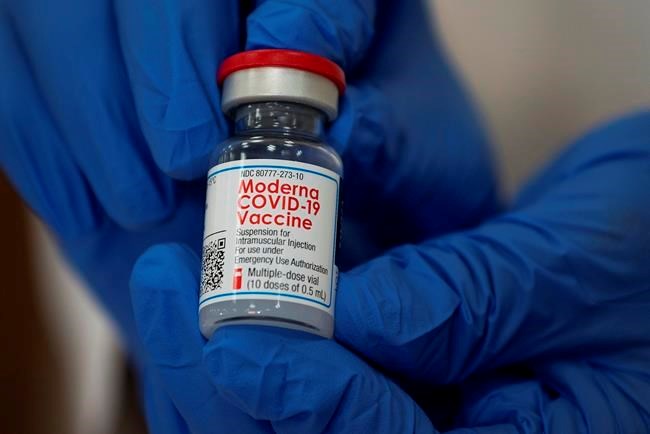OTTAWA — Health Canada approved a second COVID-19 vaccine Wednesday, paving the way for the shots from U.S. biotech firm Moderna to start arriving in the country.
Prime Minister Justin Trudeau welcomed the move during a news conference in which he also announced that Canada will receive more doses next month of the Pfizer-BioNtech vaccine than previously expected, after it was approved by Health Canada on Dec. 9.
Between the early doses already in the country, and the shipments now scheduled, Canada should have at least 1.2 million doses from Pfizer and Moderna delivered by Jan. 31, Trudeau said.
Eventually in 2021, enough doses will arrive from the two companies to vaccinate 30 million people, or almost the entire adult population in Canada.
But Trudeau warned of a long road still ahead.
Speaking outside his Ottawa residence, the prime minister issued a final plea before Christmas for Canadians to restrain themselves from attending or hosting large gatherings to prevent a post-holiday surge in COVID-19 cases.
“Our country has been through difficult Christmases before. There have been times when our grandparents or parents couldn't be with family or had to put traditions on hold,” said Trudeau, who marks his 49th birthday on Dec. 25.
"Well this Christmas, it's our turn. It's up to us to protect each other. It's up to us to pull together to hold on and to know however dark the winter may be, spring is coming and better days will be back."
New cases of the novel coronavirus were reported in nearly all provinces Wednesday as both Ontario and Quebec also prepared to re-enter lockdown mode in a bid to curb their record high levels of cases.
The rollout of the Moderna vaccine is expected to begin within days, with Health Canada saying it expects up to 168,000 doses to be delivered by the end of December.
"After assessing all the data, we concluded that there was strong evidence that showed the benefits of this vaccine outweigh the potential risks," Health Canada's chief medical officer Dr. Supriya Sharma told a news conference in Ottawa.
While the Pfizer vaccine is being distributed in different cities across Canada, officials said the Moderna version will be distributed to more remote communities. That is because it does not need the same extreme-cold storage as the Pfizer version.
The first doses are prioritized for front-line health staff, residents and workers in long-term care, adults in remote Indigenous communities, and seniors over the age of 80 living in the community.
Long-term care facilities in Ontario and Quebec continue to struggle with outbreaks of COVID-19, and on Wednesday, Trudeau committed another $70 million to help the Canadian Red Cross respond.
The prime minister also announced that Canada was extending a ban on flights from Britain for another two weeks to Jan. 6 as the United Kingdom struggles with a new strain of COVID-19 that experts suggest is more contagious than other variants.
Sharma expressed confidence that the approved vaccines will remain effective against the new COVID-19 strain identified in the United Kingdom.
“We still are waiting for confirmation of the testing of these vaccines against that specific variant,” she said. “In general, we believe that they will be ... effective."
Yukon's Health Minister Pauline Frost described the Moderna approval as the "exciting news Yukoners have been waiting for," adding immunization clinics will begin the first week of January.
Frost said delivery of 7,200 doses will be enough to allow 3,600 residents of the territory to receive the two doses needed for immunity. A similar number will be delivered to Northwest Territories, Health Minister Julie Green said.
Maj.-Gen. Dany Fortin, the military officer charged with overseeing the logistical challenge of distributing vaccine doses across Canada, said the first Moderna doses will be delivered to the three territories on Monday.
He also said officials are preparing to ramp up next week from 14 vaccine delivery sites to 100 to handle the expanded influx of vaccine doses from Moderna and Pfizer.
“We're building capacity and collaborating with our federal provincial, territorial and Indigenous partners to ensure that as many Canadians as possible can be safely immunized against COVID-19, and as quickly as possible,” Fortin said.
Canada’s deputy public health officer Dr. Howard Njoo said the plan remains to have all Canadians vaccinated by next September.
Canada is to get 40 million doses of Moderna's vaccine in 2021, enough to vaccinate 20 million people, or about two-thirds of the Canadian adult population.
The vaccine is not yet recommended for use on children as tests on adolescents only began in December and tests on children younger than 12 won't begin until next year.
People with severe allergies have been advised against getting the Pfizer vaccine after several people in Britain had reactions to the inoculation. Sharma said the same advice is being given for the Moderna vaccine and the company will have to continue to provide safety information.
Canada's doses of the Moderna vaccine are being made in Europe.
Two more vaccines are being reviewed by Health Canada, one from AstraZeneca and the other from Johnson and Johnson, Sharma said, but more information is needed before they can be approved.
British Columbia's top doctor said the province could receive its first doses of the Moderna vaccine as early as Monday, while more than 5,600 people have been immunized so far with the Pfizer vaccine.
Provincial health officer Dr. Bonnie Henry said Wednesday that COVID-19 cases in the province are levelling off after peaking in mid-November, though she warns now is not the time to relax public health rules.
This report by The Canadian Press was first published Dec. 23, 2020.
—With files from Mia Rabson in Ottawa, Beth Leighton in Vancouver and Shawn Jeffords in Toronto.
Lee Berthiaume, The Canadian Press



